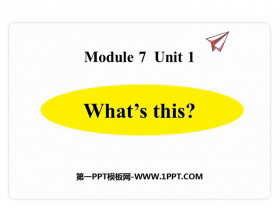


《Will people have robots?》PPT课件6
Objectives
To learn to use will + do
To learn to use there will be
To be able to predict city in the future with the words more, fewer, less
肯定句:
1) I will fly rockets to the moon when I grow up.
2) We will have robots in our homes in 100 years.
3) My uncle will come to Beijing next week.
4) They will study at home on computers in the future.
5) The environment will be in great danger.
6) Cities will be very big and crowded.
... ... ...
Guessing Game
to test your sense of observation
to test your ability of short-term memory
to test your ability to highlight the language points
Fill in the blanks.
1) I ______(fly) rockets to the moon when I grow up.
2) We _________(have) robots in our homes in 100 years.
3) My uncle __________(come) to Beijing next week.
4) We _________(use) money in 100 years.
5) Kids _________(go) to school in the future.
... ... ...
一般将来时
[经典例句]
1. London will host the Olympic Games in 2012.
2. I won’t be free tomorrow evening.
3. — Will Mike go to the picnic next week?
— Yes, he will.
一般将来时:
由“will+动词原形”构成。一般将来时表示将来某个时间要发生的动作或存在的状态,也表示将来经常或反复发生的动作,常与表将来的时间状语连用,如: tomorrow, next week, in the future。
例如:
We will come to see you next week.
Will people use money in 100 years?
How will the world be different in the future?
We won’t go to school tomorrow.
关键词:《Will people have robots?》教学课件,人教版八年级上册英语课件,八年级英语幻灯片课件下载,《Will people have robots?》PPT课件下载,.ppt格式












